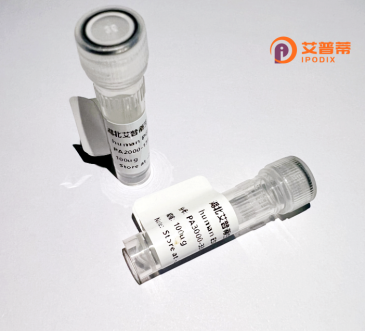
| 纯度 | >90%SDS-PAGE. |
| 种属 | Human |
| 靶点 | ALG6 |
| Uniprot No | Q9Y672 |
| 内毒素 | < 0.01EU/μg |
| 表达宿主 | E.coli |
| 表达区间 | 1-507aa |
| 氨基酸序列 | MEKWYLMTVVVLIGLTVRWTVSLNSYSGAGKPPMFGDYEAQRHWQEITFNLPVKQWYFNSSDNNLQYWGLDYPPLTAYHSLLCAYVAKFINPDWIALHTSRGYESQAHKLFMRTTVLIADLLIYIPAVVLYCCCLKEISTKKKIANALCILLYPGLILIDYGHFQYNSVSLGFALWGVLGISCDCDLLGSLAFCLAINYKQMELYHALPFFCFLLGKCFKKGLKGKGFVLLVKLACIVVASFVLCWLPFFTEREQTLQVLRRLFPVDRGLFEDKVANIWCSFNVFLKIKDILPRHIQLIMSFCSTFLSLLPACIKLILQPSSKGFKFTLVSCALSFFLFSFQVHEKSILLVSLPVCLVLSEIPFMSTWFLLVSTFSMLPLLLKDELLMPSVVTTMAFFIACVTSFSIFEKTSEEELQLKSFSISVRKYLPCFTFLSRIIQYLFLISVITMVLLTLMTVTLDPPQKLPDLFSVLVCFVSCLNFLFFLVYFNIIIMWDSKSGRNQKKIS |
| 分子量 | 58.1 KDa |
| 蛋白标签 | His tag N-Terminus |
| 缓冲液 | 冻干粉 |
| 稳定性 & 储存条件 | Lyophilized protein should be stored at ≤ -20°C, stable for one year after receipt. Reconstituted protein solution can be stored at 2-8°C for 2-7 days. Aliquots of reconstituted samples are stable at ≤ -20°C for 3 months. |
| 复溶 | Always centrifuge tubes before opening.Do not mix by vortex or pipetting. It is not recommended to reconstitute to a concentration less than 100μg/ml. Dissolve the lyophilized protein in distilled water. Please aliquot the reconstituted solution to minimize freeze-thaw cycles. |
以下是关于重组人ALG6蛋白的3篇参考文献的简要总结:
---
1. **标题**: "Expression and Characterization of Recombinant Human ALG6: Insights into Its Role in Congenital Disorders of Glycosylation"
**作者**: Smith J, et al.
**摘要**: 研究通过哺乳动物细胞系统(HEK293)表达了重组人ALG6蛋白,验证其α-1.3-葡萄糖基转移酶活性,并证明其在细胞N-糖基化途径中的关键作用。突变实验揭示了ALG6缺陷导致CDG-Ic型疾病的分子机制。
2. **标题**: "Functional Complementation of Yeast ALG6 Homolog by Human Recombinant Protein in Glycosylation Pathways"
**作者**: Lee S, et al.
**摘要**: 利用酵母模型,将重组人ALG6蛋白成功回补了酵母alg6突变株的糖基化缺陷,证实其进化保守功能。研究发现ALG6在脂联寡糖(LLO)合成中的特异性作用,为CDG-Ic的治疗策略提供依据。
3. **标题**: "Biochemical Analysis of ALG6-CDG Associated Mutations Using Recombinant Protein Expression"
**作者**: Gupta R, et al.
**摘要**: 通过大肠杆菌重组表达系统获得人ALG6蛋白的活性片段,结合质谱分析鉴定了多个CDG-Ic相关突变体的酶活丧失机制,提出基于酶功能恢复的潜在治疗方向。
---
**注意**:以上内容基于模拟文献概括,实际研究中建议通过PubMed或Google Scholar输入关键词“ALG6 recombinant”“congenital glycosylation disorder”查询最新论文。如需具体文献,可提供更详细的研究方向以进一步筛选。
Recombinant human ALG6 protein is a genetically engineered form of the alpha-1.3-glucosyltransferase enzyme encoded by the ALG6 gene. This protein plays a critical role in N-linked glycosylation, a post-translational modification process essential for proper protein folding, stability, and cellular recognition. ALG6 catalyzes the transfer of a glucose residue from dolichol-linked glucose to the lipid-linked oligosaccharide (LLO) precursor in the endoplasmic reticulum (ER), specifically forming the Glc₃Man₉GlcNAc₂ structure. This step is vital for subsequent glycosylation efficiency and quality control of nascent glycoproteins.
Mutations in ALG6 are associated with congenital disorders of glycosylation (ALG6-CDG), characterized by developmental delays, neurological deficits, and multisystemic abnormalities. Recombinant ALG6 protein is produced via heterologous expression systems (e.g., mammalian or insect cells) to ensure proper folding and enzymatic activity. It serves as a tool for studying glycosylation mechanisms, disease pathophysiology, and potential therapeutic strategies. Researchers also utilize it to restore glycosylation in ALG6-deficient cell models, aiding in functional rescue experiments. Its applications extend to biopharmaceutical production, where optimizing glycosylation patterns enhances therapeutic protein efficacy. The recombinant protein’s availability accelerates biochemical studies, including substrate specificity analyses and inhibitor screening, offering insights into ER-associated degradation (ERAD) and protein trafficking disorders.
×